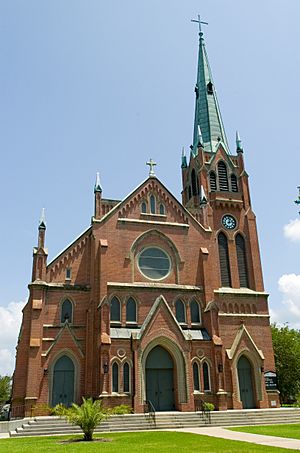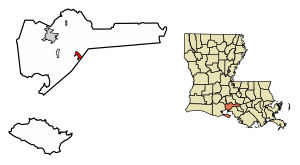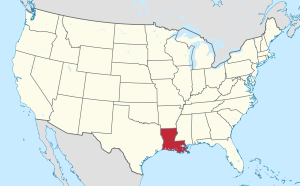Jeanerette, Louisiana facts for kids
Quick facts for kids
Jeanerette, Louisiana
|
|
|---|---|
| City of Jeanerette | |

St. John the Evangelist Roman Catholic Church, Jeanerette
|
|
| Nickname(s):
Sugar City
|
|
| Anthem: Markae' DEQ | |

Location of Jeanerette in Iberia Parish, Louisiana.
|
|

Location of Louisiana in the United States
|
|
| Country | United States |
| State | Louisiana |
| Parish | Iberia |
| Area | |
| • Total | 2.36 sq mi (6.12 km2) |
| • Land | 2.31 sq mi (5.98 km2) |
| • Water | 0.05 sq mi (0.14 km2) |
| Elevation | 16 ft (5 m) |
| Population
(2020)
|
|
| • Total | 4,813 |
| • Density | 2,085.36/sq mi (805.09/km2) |
| Time zone | UTC-6 (CST) |
| • Summer (DST) | UTC-5 (CDT) |
| ZIP code |
70544
|
| Area code(s) | 337 |
| FIPS code | 22-38075 |
Jeanerette (pronounced JIN-ret) is a city in Iberia Parish, Louisiana, United States. It's often called "Sugar City" because of its history with sugar cane. In 2020, about 4,813 people lived there.
Jeanerette is part of the larger Lafayette metropolitan area. It is also in the Acadiana region, which is known for having many people who speak French or Louisiana Creole.
Contents
History of Jeanerette
How Jeanerette Began
In the 1700s, a French settler named Pierre Zerangue got land from the Spanish government where Jeanerette is today. He received a special permission to survey and settle on about 1,052 acres. Under Spanish law, if someone lived on a property for two years, they could officially claim it.
Later, Nicholas Provost bought land nearby. He grew sugar cane, which was a big crop back then. This work was done by enslaved people until he passed away in 1816.
The city got its name from John W. Jeanerette. He moved to the area from South Carolina in the 1820s. First, he worked as a tutor for a family that owned a plantation. Then, he opened a store and a saloon.
Around 1830, John Jeanerette bought a plantation called Pine Grove. It used to be known as Beau Pré, which means "lovely meadow" in French. He even let people use part of his house as a place to pick up mail. Later, he became the town's first postmaster. That's how the name Jeanerette was chosen for the post office and the town.
In 1871, Lazard Wormser, who was a Jewish settler from Alsace, France, opened a small general store in Jeanerette. Other members of his family joined him. They later opened more Wormser's Department Stores in nearby towns like New Iberia and Franklin.
During the 1800s, a community grew north of the Bayou Teche. It was settled by free Creoles of color, who were people with both African and European ancestors. They often spoke French and followed French customs and the Catholic faith. This area is now known as Grand Marais.
Becoming an Official Town
Jeanerette officially became a town in 1878. Joseph E. Provost was its first mayor. The town's economy was built on the cypress lumber and sugar industries. This is why it earned the nickname "Sugar City."
Even though Jeanerette grew a lot after the Civil War, you can still find some old houses from before the war in the city and nearby.
Sugar cane is still very important to Jeanerette's economy today. In the past, there were three sugar mills. The one in the city was closed and its equipment was sold in the early 2000s. Jeanerette is also home to companies that make machines for growing, harvesting, and processing sugar cane.
Besides sugar, the city also gets income from oil and natural gas, salt, and fishing. There's also a garment distribution center.
Jeanerette was also the home of Paul N. Cyr. He was a dentist and a politician who served as lieutenant governor of Louisiana.
Geography and Location
Jeanerette is located at coordinates 29°54′59″N 91°40′21″W. The southeastern edge of the city is right on the border between Iberia and St. Mary parishes.
Two main Louisiana highways, Highway 182 and Highway 87, go through Jeanerette. They both run next to the Bayou Teche. U.S. Highway 90 runs parallel to the city. These roads connect Jeanerette to other cities like New Iberia (about 12 miles northwest) and Franklin (about 14 miles southeast).
The United States Census Bureau says that the city covers a total area of about 2.2 square miles (5.7 square kilometers), and all of it is land.
Climate of Jeanerette
The weather in Jeanerette has hot, humid summers and winters that are usually mild or cool. This type of weather is called a humid subtropical climate.
| Climate data for Jeanerette 5 NW, Louisiana (1991–2020 normals, extremes 1892–present) | |||||||||||||
|---|---|---|---|---|---|---|---|---|---|---|---|---|---|
| Month | Jan | Feb | Mar | Apr | May | Jun | Jul | Aug | Sep | Oct | Nov | Dec | Year |
| Record high °F (°C) | 89 (32) |
85 (29) |
90 (32) |
93 (34) |
98 (37) |
104 (40) |
104 (40) |
103 (39) |
101 (38) |
98 (37) |
93 (34) |
89 (32) |
104 (40) |
| Mean daily maximum °F (°C) | 60.9 (16.1) |
64.5 (18.1) |
71.0 (21.7) |
77.1 (25.1) |
83.4 (28.6) |
88.1 (31.2) |
89.6 (32.0) |
90.0 (32.2) |
86.8 (30.4) |
79.6 (26.4) |
70.0 (21.1) |
63.4 (17.4) |
77.0 (25.0) |
| Daily mean °F (°C) | 51.4 (10.8) |
55.1 (12.8) |
61.3 (16.3) |
67.4 (19.7) |
74.4 (23.6) |
79.9 (26.6) |
81.4 (27.4) |
81.4 (27.4) |
77.7 (25.4) |
69.0 (20.6) |
59.3 (15.2) |
53.6 (12.0) |
67.7 (19.8) |
| Mean daily minimum °F (°C) | 41.9 (5.5) |
45.7 (7.6) |
51.7 (10.9) |
57.8 (14.3) |
65.3 (18.5) |
71.7 (22.1) |
73.3 (22.9) |
72.7 (22.6) |
68.6 (20.3) |
58.5 (14.7) |
48.7 (9.3) |
43.8 (6.6) |
58.3 (14.6) |
| Record low °F (°C) | 11 (−12) |
3 (−16) |
21 (−6) |
30 (−1) |
42 (6) |
52 (11) |
58 (14) |
56 (13) |
40 (4) |
29 (−2) |
22 (−6) |
10 (−12) |
3 (−16) |
| Average precipitation inches (mm) | 5.12 (130) |
4.00 (102) |
3.86 (98) |
4.81 (122) |
5.06 (129) |
7.46 (189) |
7.85 (199) |
7.28 (185) |
6.56 (167) |
4.61 (117) |
4.10 (104) |
4.74 (120) |
65.45 (1,662) |
| Average precipitation days (≥ 0.01 in) | 11.4 | 9.2 | 8.4 | 7.8 | 8.8 | 13.7 | 15.2 | 13.9 | 11.6 | 8.1 | 8.9 | 10.2 | 127.2 |
| Source: NOAA | |||||||||||||
Population and People
| Historical population | |||
|---|---|---|---|
| Census | Pop. | %± | |
| 1880 | 698 | — | |
| 1890 | 1,309 | 87.5% | |
| 1900 | 1,905 | 45.5% | |
| 1910 | 2,206 | 15.8% | |
| 1920 | 2,512 | 13.9% | |
| 1930 | 2,228 | −11.3% | |
| 1940 | 3,362 | 50.9% | |
| 1950 | 4,692 | 39.6% | |
| 1960 | 5,568 | 18.7% | |
| 1970 | 6,322 | 13.5% | |
| 1980 | 6,511 | 3.0% | |
| 1990 | 6,205 | −4.7% | |
| 2000 | 5,997 | −3.4% | |
| 2010 | 5,530 | −7.8% | |
| 2020 | 4,813 | −13.0% | |
| U.S. Decennial Census | |||
Jeanerette's population has changed over the years. In 2020, there were 4,813 people living in the city. There were 1,956 households and 1,324 families.
| Race | Number | Percentage |
|---|---|---|
| White (non-Hispanic) | 1,146 | 23.81% |
| Black or African American (non-Hispanic) | 3,417 | 71.0% |
| Native American | 2 | 0.04% |
| Asian | 17 | 0.35% |
| Other/Mixed | 128 | 2.66% |
| Hispanic or Latino | 103 | 2.14% |
According to the 2020 census, about 71% of the people in Jeanerette are Black or African American. About 23.8% are White. A small percentage are Native American, Asian, or of other backgrounds. About 2.1% are Hispanic or Latino.
In 2019, the average household income was $34,643. The income per person was $17,196. About 25.4% of the population lived below the poverty line.
Education in Jeanerette
The Iberia Parish School System is in charge of schools in Jeanerette.
High Schools
- Jeanerette High School (grades 9–12) is located just outside the city.
Middle Schools
- Jeanerette Middle School (grades 7–8) is in Jeanerette.
Elementary Schools
- Jeanerette Elementary School (grades K–6) is a public school.
- St. Charles Elementary School (grades K–6) is also in Jeanerette.
There used to be another school called Canal Elementary School (grades K-2) in Jeanerette, but it is no longer open.
St. Joseph School was a private Catholic school for grades K–8. It closed in May 2011.
The Bureau of Indian Affairs supports the Chitimacha Day School. It is located southwest of Jeanerette in the Charenton community.
Famous People from Jeanerette
Many interesting people have connections to Jeanerette:
- Hiram Eugene (born 1980) is a former American football safety. He played in the National Football League (NFL).
- Alexander Allain (1920–1994) was a lawyer. He was known for his work to protect freedom of expression, especially for libraries.
- Bret Allain is a current state senator for District 21 in Louisiana. He is also a sugar cane farmer from St. Mary Parish.
- Stuart Bishop was born in Jeanerette. He became a state representative for Lafayette Parish.
- Simone B. Champagne was a former state representative for Iberia and Vermilion parishes. She is now a financial officer for the City of Youngsville, Louisiana.
- Paul N. Cyr was a dentist from Jeanerette. He served as the lieutenant governor of Louisiana from 1928 to 1932.
- Troy Hebert was a former Commissioner of the Louisiana Office of Alcohol and Tobacco Control. He also served in both houses of the Louisiana State Legislature.
Images for kids
See also
 In Spanish: Jeanerette para niños
In Spanish: Jeanerette para niños
 | Madam C. J. Walker |
 | Janet Emerson Bashen |
 | Annie Turnbo Malone |
 | Maggie L. Walker |




